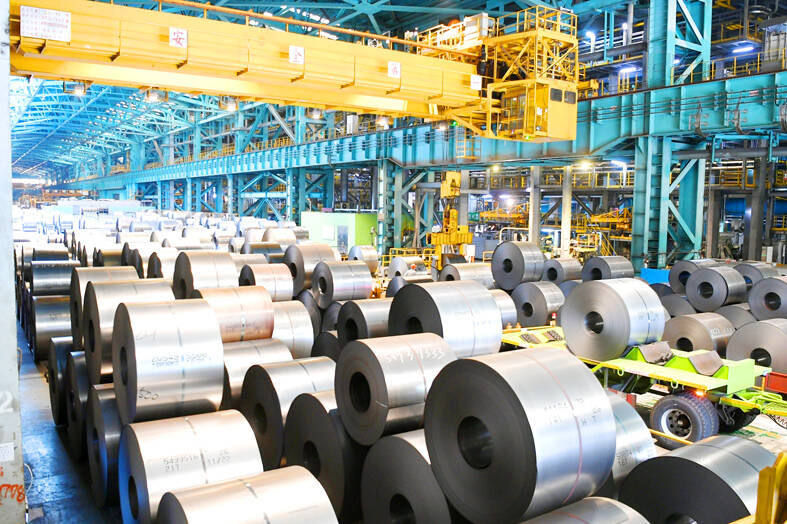China Steel Corp (中鋼), the largest steelmaker in Taiwan, yesterday hiked steel prices extensively by as much as NT$800 per tonne for domestic deliveries next month and next quarter as the global steel industry is emerging from a one-and-a-half-year slump amid an improving global economy.
The Kaohsiung-based steelmaker said the price hikes came on the heels of price upticks by global peers as moderating inflation and a recovering economy boost car demand and steel consumption.
Next year, total car shipments are to expand 4 percent to 90.2 million globally, China Steel said in a statement, citing forecasts by J.D. Power.

Photo courtesy of China Steel Corp
The World Steel Association also raised its forecast for next year’s steel demand to an annual growth of 1.9 percent, representing an increase of 34.60 million tonnes, a clear indicator that the global steel industrial downcycle is approaching its end, it said.
“The global steel industry is experiencing a prolonged downturn lasting one-and-a-half years. As inventory on the supply chain has dropped to a relatively low level, the steel industry is to usher in a growth period in the first quarter of next year in terms of shipments and prices,” China Steel said.
In Asia, Chinese peers Baowu Steel Group Ltd (寶武鋼鐵), the world’s largest steelmaker, and Angang Steel Co (鞍山鋼鐵) increased the prices of all steel products by between 100 and 200 yuan per tonne for deliveries next month, marking the seventh month of price hikes, China Steel said in its statement.
The price hikes have spread to the rest of the Asian markets and heralded a new wave of price hikes, the steelmaker said.
In the US and European markets, steelmakers have raised prices by 64 percent and 12 percent for hot-rolled steel products since October, which would lead to further price hikes beyond this month, it said.
Apart from a pickup in demand, China Steel said it is raising prices to reflect higher raw material and transportation costs. The price of iron ore climbed to as high as US$140 per tonne, hitting the digest level this year. The prices of coking coal advanced to US$340 per tonne due to lower production from China and Australia.
Transportation costs climbed as the Baltic Exchange’s index for shipping vessels transporting dry bulk commodities soared 135 percent to 2500 from the beginning of September, the steelmaker said.
China Steel yesterday accelerated price hikes by between NT$500 and NT$700 per tonne for deliveries next month, with the steepest price hikes were for hot-rolled coils and electro-galvanized steel coils used in building construction.
For the next quarter, steel prices are to rise faster by between NT$500 and NT$800 per tonne.
The prices of steel rods and high-grade steel plates advanced the most.

GROWING OWINGS: While Luxembourg and China swapped the top three spots, the US continued to be the largest exposure for Taiwan for the 41st consecutive quarter The US remained the largest debtor nation to Taiwan’s banking sector for the 41st consecutive quarter at the end of September, after local banks’ exposure to the US market rose more than 2 percent from three months earlier, the central bank said. Exposure to the US increased to US$198.896 billion, up US$4.026 billion, or 2.07 percent, from US$194.87 billion in the previous quarter, data released by the central bank showed on Friday. Of the increase, about US$1.4 billion came from banks’ investments in securitized products and interbank loans in the US, while another US$2.6 billion stemmed from trust assets, including mutual funds,

Micron Memory Taiwan Co (台灣美光), a subsidiary of US memorychip maker Micron Technology Inc, has been granted a NT$4.7 billion (US$149.5 million) subsidy under the Ministry of Economic Affairs A+ Corporate Innovation and R&D Enhancement program, the ministry said yesterday. The US memorychip maker’s program aims to back the development of high-performance and high-bandwidth memory chips with a total budget of NT$11.75 billion, the ministry said. Aside from the government funding, Micron is to inject the remaining investment of NT$7.06 billion as the company applied to participate the government’s Global Innovation Partnership Program to deepen technology cooperation, a ministry official told the

AI TALENT: No financial details were released about the deal, in which top Groq executives, including its CEO, would join Nvidia to help advance the technology Nvidia Corp has agreed to a licensing deal with artificial intelligence (AI) start-up Groq, furthering its investments in companies connected to the AI boom and gaining the right to add a new type of technology to its products. The world’s largest publicly traded company has paid for the right to use Groq’s technology and is to integrate its chip design into future products. Some of the start-up’s executives are leaving to join Nvidia to help with that effort, the companies said. Groq would continue as an independent company with a new chief executive, it said on Wednesday in a post on its Web

Taiwan Semiconductor Manufacturing Co (TSMC, 台積電), the world’s leading advanced chipmaker, officially began volume production of its 2-nanometer chips in the fourth quarter of this year, according to a recent update on the company’s Web site. The low-key announcement confirms that TSMC, the go-to chipmaker for artificial intelligence (AI) hardware providers Nvidia Corp and iPhone maker Apple Inc, met its original roadmap for the next-generation technology. Production is currently centered at Fab 22 in Kaohsiung, utilizing the company’s first-generation nanosheet transistor technology. The new architecture achieves “full-node strides in performance and power consumption,” TSMC said. The company described the 2nm process as